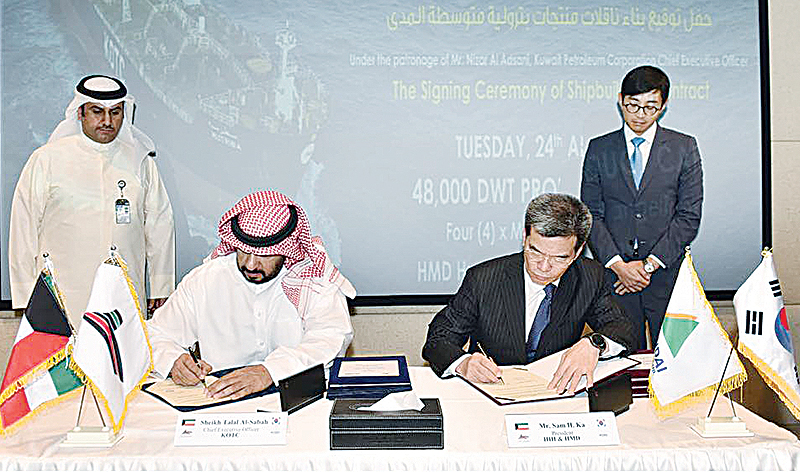17 South Korean companies currently implementing $30 million-worth projects in Kuwait

KUWAIT: The trade volume between Kuwait and South Korea has totaled $14 billion in 2018, up by 33 percent, compared to 2017's, which was divided between $12.7 billion as Kuwaiti exports and $1.3 billion as South Korean imports. Kuwaiti exports of crude oil and its derivatives enjoyed the lion's share of trade exchange with South Korea, especially since the GCC-member state is Seoul's second-largest energy supplier after Saudi Arabia, the South Korean Embassy in Kuwait said yesterday.
South Korean Prime Minister Lee Nak-yeon is scheduled to make a four-day official visit to Kuwait on Tuesday, during which he will meet top officials. His visit aims to find new prospects of cooperation between Kuwait and South Korea, and boost the current state of their bilateral relationship in various fields. The ASEAN plus Three member has become the ninth-largest export country in Kuwait, according to Central Statistical Bureau's fourth quarter data of 2018.South Korean imports in Q4'18 have totaled KD 83.8 million, equaling $247.8 million, down by 16.4 percent compared to Q4'17, CSB said in its latest economic bulletin. It has maintained its ninth rank among most important export countries to Kuwait early this year with total imports of KD 28.4 million, equaling $93.7 million, in January 2019, and a share of 3.1 percent of total Kuwaiti imports.
Furthermore, Korean companies play a significant role in Kuwaiti economy, among which 17 major ones working in engineering, constructions, hardware, and energy sectors, are currently implementing $30 million-worth projects in the country. There are some 150 South Korean commercial agencies currently working in the country and dealing with 100 of their Kuwaiti counterparts, mostly in automobiles field and auto spare parts. In addition, Kuwait invests over $900 million annually in South Korea in financial, banking, and oil fields.
In October 1999, Kuwait and South Korea signed a memorandum of understanding on boosting and enhancing their commercial and industrial cooperation, including exchange of bilateral visits, benefit from advanced technologies, increase bilateral industrial cooperation, and make Kuwait a center for advanced manufacturing technology. The two countries also aim to bolster their commercial and economic cooperation, indigenize technological industries of positive outcome on them and their investors, especially since the Koreans are well-reputed for their constructions expertise, particularly roads, oil tankers, and commercial vessels.
The Korean companies in Kuwait also play a vital role in implementing economic reformation projects. South Korean construction firm Hyundai Heavy Industries, for instance, has co-built the Az-Zour North Independent Water and Power Project in Kuwait as part of bilateral partnership deal between their state and private sectors. The project, in a full operational capability, produced 1,539 megawatts of electricity, equaling 10 percent of total current power generation in Kuwait, while its desalinated water production capacity totals around 107 million daily gallons, making up 20 percent of current total capacity in water desalination in the country.
Korean firms also co-work with their Kuwaiti counterparts in other projects related to New Kuwait Vision 2035, including Sheikh Jaber Bridge which aims to short-cuts distance between Kuwait City and Subbiyah area from 104 kilometers, 90 minutes of driving, to 37.5 kilometers, 30 minutes driving. The Kuwaiti-Korean cooperation also includes building smart and environment-friendly cities, in which South Korea's Land and Housing Corporation (LH) developed a detailed design for South Saad Al-Abdullah area to accommodate 30,000 residential units to be the first smart and environmental-friendly city in the country. In 2018, Kuwait Directorate General for Civil Aviation (DGCA) agreed with Korean Incheon International Airport Corporation (IIAC) to operate, manage, maintain, and develop the new Terminal Four (T4) at Kuwait International Airport. - KUNA







